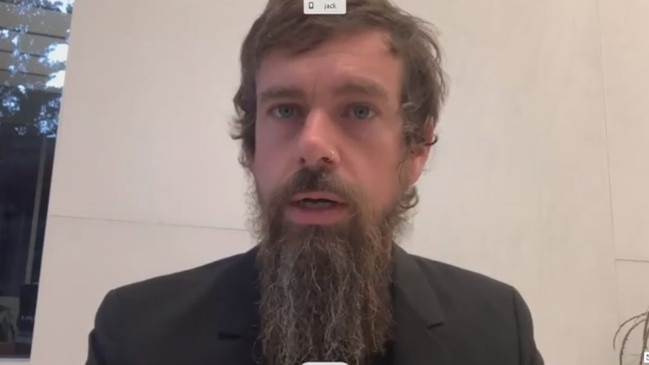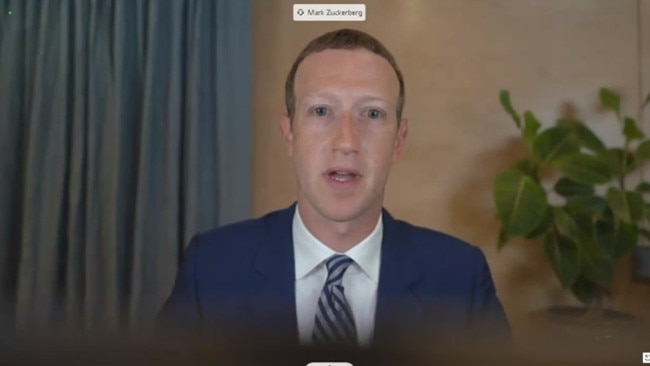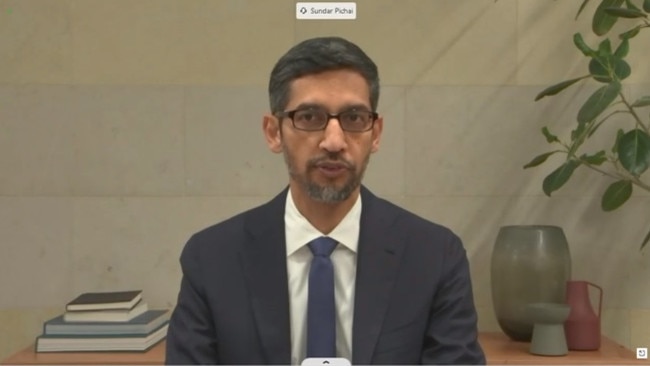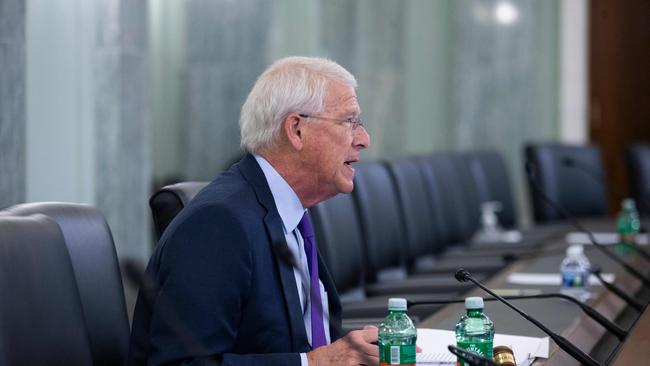Twitter, Facebook, Google grilled in fiery US Senate hearing
The CEOs of Twitter, Facebook and Google were accused of political bias during a US Senate hearing itself accused of being ‘a sham’.

Should Facebook, Google and Twitter take action in Australia against “Mediscare” style campaigns at election time? What about Clive Palmer’s claims of Labor planning to introduce a death tax?
Those types of issues in a bigger US context were the subject of a grilling of the CEOs of Facebook, Alphabet and Twitter by a US select committee examining their policies to remove or flag content posted during the US election campaign. At times the interchanges were hostile.
Section 230 of the US Communications Decency Act lets the tech giants remove material considered to be obscene, lewd, lascivious, filthy, excessively violent, harassing or otherwise objectionable. The law shields them from liability under the US First Amendment protecting free speech.
The fact the hearing took place within a week of the US election means it is seen as partisan by the Democrats, with one Senator branding it “a sham”.
The tipping point for the hearing was Facebook’s and Twitter’s action to block or limit the online distribution of The New York Post’s recent story about Joe Biden’s son Hunter, and his activities in Ukraine. The Trump team see it as a flashpoint issue at the election but the alleged facts around it are hotly disputed and many have dismissed them.
That said, the hearing exposed the inconsistencies and problems that big tech has with either removing contenting or qualifying it as untrustworthy. The hearing foreshadowed other issues these companies face regarding their anti-competitive and monopolistic behaviour, and how they are undermining the ability of the US media to make sufficient revenue to survive.
An often vague Twitter CEO Jack Dorsey faced an angry verbal assault by Texas Republican Senator Ted Cruz over Twitter’s decision to stop users sharing the New York Post story. “Who the hell elected you?” he told Dorsey.
Dorsey’s response was not that Twitter believed the story was factually incorrect, rather it had violated a policy Twitter adopted in 2018 to limit the spread of information resulting from hacking.
Cruz’s retort was that Twitter didn’t block tweets about The New York Times’ expose on the president’s failure to pay tax, based on leaked copies of his tax returns.

Plenty of other claimed inconsistencies were raised. Dorsey was grilled for Twitter letting through tweets from a Chinese Communist Party spokesperson saying that the US military caused the coronavirus, but flagging a tweet by President Trump about the security of mail ballots.
He was asked why Twitter had allowed Iran’s Supreme Leader Ayatollah Ali Khamenei’s tweet that raised uncertainty about the existence of the Holocaust. It remained online today.
#Holocaust is an event whose reality is uncertain and if it has happened, it's uncertain how it has happened.
— Khamenei.ir (@khamenei_ir) March 21, 2014
(Above: The Republicans argue that President Trump tweets have been removed but not a Holocaust denying tweet by Iran’s Ayatollah Ali Khamenei.)
Dorsey said some tweets by world leaders amounted to “sabre rattling” and didn’t breach Twitter’s terms of service which users agreed to when they signed up.
It was a partisan affair, with Republicans claiming big tech was biased against conservative views, and Democrats saying the hearing was politically motivated.
Below the surface issues about big tech’s information gatekeeping were playing out: where do you draw the line between fact and opinion? Should social media have any role in vetting content beyond obvious concerns about public safety and health? Should politicians be given a free rein to lie on social media?
All three CEO’s began by addressing the hearing. Dorsey proposed three ways Twitter could better address content vetting. “The first is requiring a services moderation process to be published, our cases recorded and reviewed, how decisions are made, what tools are used to enforce it.”
He said the second was a straightforward appeals decision, and the third was visibility around the use of algorithms.
Alphabet and Google CEO Sundar Pichai said the company publicly disclosed clear guidelines for its products and platforms “which we enforce impartially”.
“We recognise that people come to our services from a broad spectrum of perspectives, and we are dedicated to building products that are helpful to users of all backgrounds and viewpoints.
“I would urge the committee to be very thoughtful about any changes to section 230, and to be very aware of the consequences that changes might have on businesses and customers,” he warned.
Facebook CEO Mark Zuckerberg said he didn’t believe that private companies should make so many decisions about these issues by themselves and welcomed more regulation.
“At Facebook. we often have to balance competing equities. Sometimes the best approach from a safety or security perspective isn‘t the best for privacy or free expression.

“So we work with the need to strike the right balance. We don‘t always get it right, but we try to be fair and consistent. The reality is that people have very different ideas and theories about where the lines should be.
“Democrats often say that we don‘t remove enough content and Republicans often say we remove too much. I expect that we’ll hear some of those criticisms today. But it does mean that there are real disagreements about where the limits of online speech should be.
“It strengthens my belief that … we need a more accountable process that people feel is legitimate and that gives platforms certainty.”
He said Facebook had hired more than 35,000 people to work on safety and security. It had disrupted more than 100 networks coming from Russia, Iran and China, including three this week.
“This is an extraordinary election, and we‘ve updated our policies to reflect that. We’re showing people reliable information about voting and results. And we’ve strengthened our ads and misinformation policies.
“We‘re also running the largest voting information campaign in US history. We estimate that we’ve helped more than 4.4 million people register to vote and 100,000 people volunteer to be poll workers.”
Washington Senator Maria Cantwell’s contribution showed that the Democrats would pursue big tech more broadly over other issues. There was the influence of Russian and other foreign operatives as exposed after the 2016 US election. She homed in on misinformation, hate speech, privacy and the need for “a free and competitive news market”.
She said local media in the US had lost 70 per cent of revenue. “We have lost thousands and thousands of journalistic jobs that are important.”
Zuckerberg was quizzed about Facebook’s role in assisting US law enforcement to disrupt a plot to kidnap and kill Gretchen Whitmer, the governor of Michigan, who favoured enforcing coronavirus restrictions. He said Facebook had been in touch with the FBI about six months ago after detecting early activity.
All three companies said they had plans to address their platforms being used to make unsubstantiated claims about election rigging and fraud, and misleading claims about voting and the counting of votes.




To join the conversation, please log in. Don't have an account? Register
Join the conversation, you are commenting as Logout